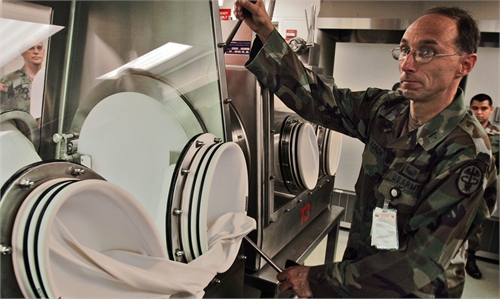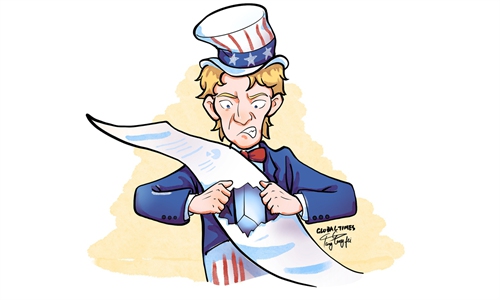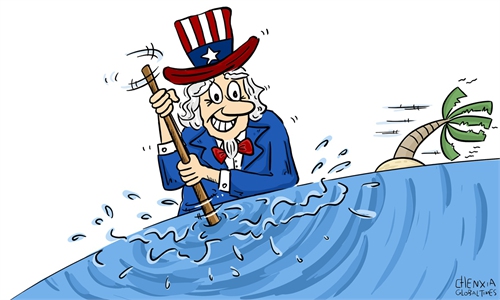IN-DEPTH / IN-DEPTH
GT investigates: US’ shameful history of immigrants, refugees mistreatment reveals democracy, human rights hypocrisy
Behind liberty’s lie
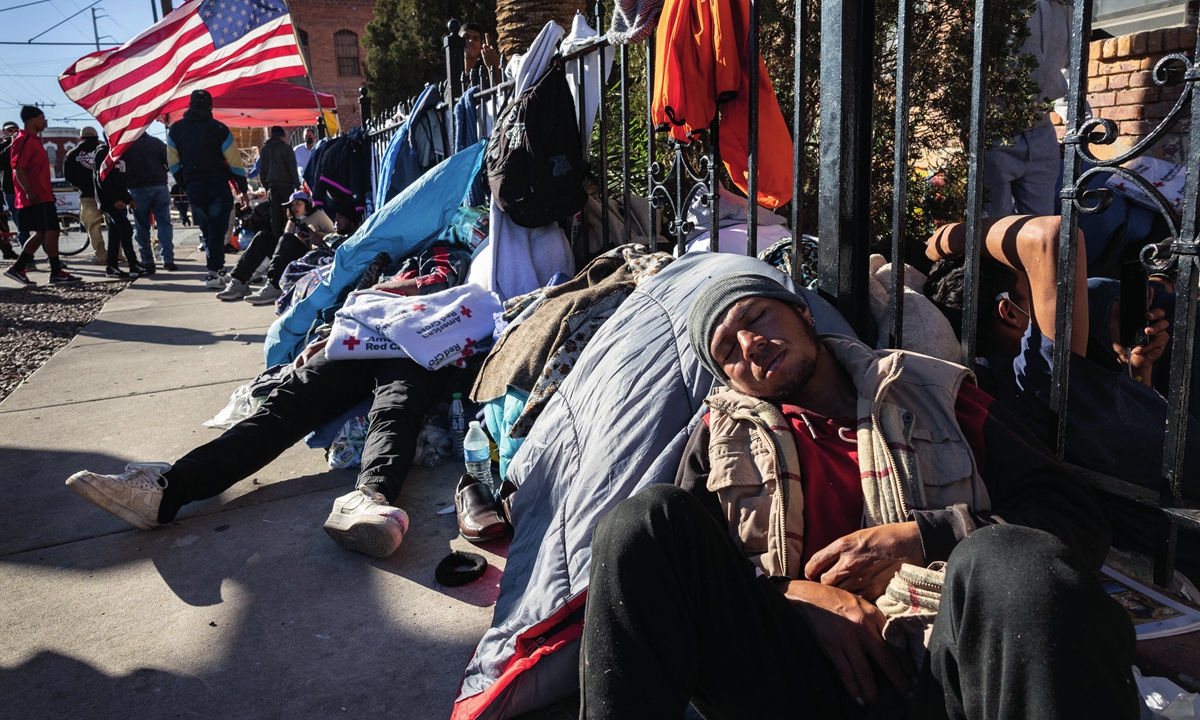
Immigrants sleep on a sidewalk near a migrant shelter on January 6, 2023, in El Paso, the US. Photo: AFP
Editor's Note:
While the US continues to buy into the dual fallacy of being the "city upon a hill" and a "beacon of democracy," the reality on the ground tells a different story - an increasingly large swathe of the American population struggles with drug abuse, growing worries around gun violence, an ever-widening economic gap between the haves and the have-nots, intensifying political polarization, more arbitrary detention of and hatred toward minorities... These sustained forms of unrest not only exacerbate social inequality and worsen domestic human rights conditions, but also expose US hypocrisy as it is unable to resolve its own issues, yet it never stops criticizing other nations' human rights records.
The Global Times is publishing a series of articles that examine these and other sociopolitical and economic forms of chaos in the US. This is the fifth and last installment in the series that delves into the shameful and inhumane US history of its treatment of immigrants characterized by discrimination, exclusion, arrest, detention, and expulsion.
The fire on March 27 at the "Temporary Station of Ciudad Juarez" - an immigration detention center in the State of Chihuahua a few meters from the Mexican border with the US, which killed 39 people has once again brought the issues of US violations of immigrant and refugee human rights to the fore with global experts calling for prompt, thorough, and independent investigations into detention centers for migrants in the custody of the US government.
As the country with the world's largest immigration detention system and more than 200 detention facilities in its border states, the tragedy at the "Temporary Station of Ciudad Juarez" is not an isolated incident.
A total of 21 people died in US immigration detention facilities in the fiscal year 2020, US media reported, more than doubling the death toll from the fiscal year 2019 and the highest number since 2005. Up to 80 percent of the more than 1.7 million immigrants detained in the US in the fiscal year 2021 were held in private detention facilities, including 45,000 children.
The above data is just a piece of the iceberg of the litany of human rights abuses perpetrated by the US. How a country treats its most vulnerable groups is the touchstone of its democracy and human rights situation. Immigrants and refugees are among the most vulnerable groups. While the US has declared itself a "beacon of democracy and human rights," its shameful record of immigrant and refugee mistreatment has erased its facade.
On March 30, China released a report which revealed the US' egregious record and its lies and double standards on issues of refugees and immigrants. As the report was released on the second day of the US' second so-called Summit for Democracy, analysts said it highlights the US' hypocrisy on human rights, and the dysfunction of US democracy.
Bloody road of immigrants' tragedies

Immigrants communicate with Texas National Guard agents at the US border with Ciudad Juarez, Chihuahua state, Mexico, on December 20, 2022. Photo: VCG
Looking back on the US' development history, it was a bloody road full of contributions and sacrifices made by immigrants at different times, from black slaves and trafficked laborers, to today's newcomers and their families, said Li Daojun, an expert in law and human rights."The US' development largely depended on immigration, but authorities have turned a blind eye to this fact and [treat some immigrants harshly] to protect the vested interests of certain groups," Li told the Global Times.
Take Chinese immigrants as an example. Since the mid-19th century, Chinese laborers were trafficked in large numbers by Americans to the US as coolies, and by the 1880s, the total number had exceeded 100,000. Chinese laborers undertook the most arduous work in the construction of the Central Pacific Transcontinental Railroad and thousands of them died.
They made enormous contributions to the development of the US with their hard work and even gave their lives, but were not treated with respect or kindness. In 1882, the US went further and enacted the Chinese Exclusion Act, putting an absolute end to immigration from China and denying resident Chinese immigrants US citizenship.
Aside from discrimination, Chinese immigrants have also suffered from violent attacks. On October 24, 1871, 19 Chinese immigrants were killed by hundreds of white people around Calle de los Negros in Los Angeles. On September 2, 1885, white miners rioted at the Stone Springs mine in Wyoming, destroying the residential village inhabited by Chinese workers, and killing at least 28 Chinese immigrants.
Anti-Chinese sentiment increased during the COVID-19 pandemic, and so did the violence toward Asians. A poll released by the Pew Research Center in April 2021 showed that the vast majority of Asian adults (81 percent) also say violence against them had increased, far surpassing the share of all US adults (56 percent) who say the same.
As a country founded on immigration, US has been the catalysts of numerous inhumane tragedies for local immigrants and refugees. That not only severely hurts the country's reputation and international image, but also prevents more people from migrating to the country, which will harm its own development in the long run, observers warned.
Crying in modern times
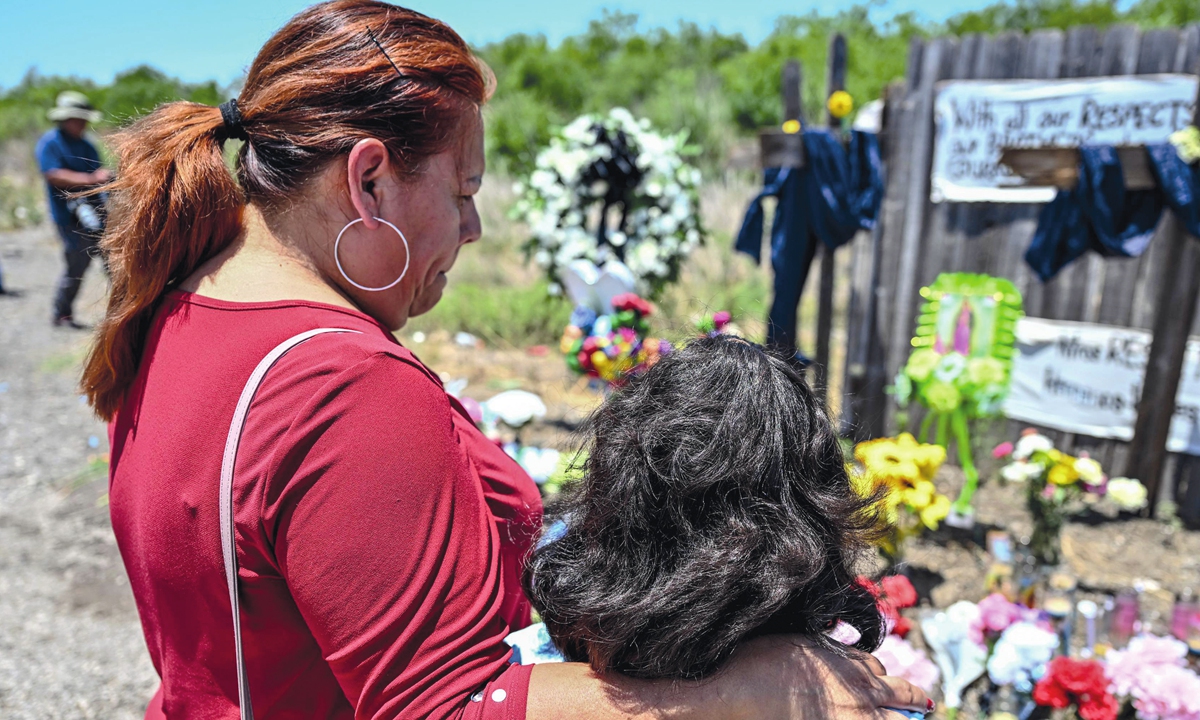
Local residents attend a vigil for the victims found in an abandoned truck in San Antonio, Texas, on June 26, 2022. Photo: Xinhua
Human rights violations against refugees and immigrants in the US have seen no improvement in modern times. In the 21st century, US governments have increasingly restricted immigration and treated immigrants harshly and inhumanely, with arrests, detentions, deportations, and the repatriation of immigrants on a large scale annually.To curtail illegal immigration, the former Trump administration implemented a "zero tolerance" policy put in place on April 2018, forcibly separating illegal immigrant families. It reportedly resulted in the separation of at least 2,300 minors from their families, most of who were from Mexico.
The merciless policy sparked outrage across the country, as hundreds of marches took place nationwide on June 30 that year with protestors demanding for the government to reunite families separated at the US-Mexico border.
At a rally the same day in Washington DC under the theme "Families Belong Together," actor and songwriter Lin-Manuel Miranda told MSNBC that they "will not stand for a country separating children from their families." "And if you (Trump) are silent on that issue, or you are somehow for that issue you're not getting re-elected."
As the only country in the world that had not ratified the Convention on the Rights of the Child, the US and its law enforcement agencies have never stopped abusing migrant children, observers found.
Among the 266,000 migrant children held in US government custody in recent years, more than 25,000 have been detained for longer than 100 days, nearly 1,000 for more than a year, and at least three for over five years, according to a Xinhua report.
Worse still, many children are detained in deplorable conditions. An article published by The New York Times on June 26, 2019, revealed how hundreds of children were locked up in one cell in a detention center at a border station in Clint, Texas.
The children there were held in prison-like conditions with virtually no adult supervision, the article said. The detention centers could be compared to "torture facilities," a pediatrician who visited the facility was quoted as saying.
The US authorities' brutal treatment of immigrant children has long raised social concerns. In the report "Detention of Immigrant Children" released in 2017, the American Association of Pediatrics noted that in accordance with internationally accepted rights of the child, "..immigrant and refugee children should be treated with dignity and respect and should not be exposed to conditions that may harm or traumatize them."
The UN High Commissioner for Human Rights Michelle Bachelet was incredibly shocked by overcrowded US detention facilities, poor sanitation conditions, and lack of access to adequate healthcare or food at the detention facilities, according to a UN website report on 8 July 2019. She stated that detaining migrant children may constitute cruel, inhuman, or degrading treatment that is prohibited under international law.
Analysts noted that deep-rooted racial discrimination in the US is a major cause of its immigration problems while political polarization has hindered the government from taking effective measures in solving these long-seated problems.
For example, the partisan divide has prevented any significant immigration reform bill from passing in Congress since the comprehensive Immigration Reform and Control Act of 1986. Both Democrats and Republicans have put forth their own immigration reform proposals, but said proposals are usually dead on arrival.
Ironically, setting aside its own poor human rights record, the US is keen on pointing fingers at others on the issue. It has released "Country Reports on Human Rights Practices" annually since 1977. The most recent report published in March, just like the previous ones, is filled with groundless accusations attacking China.
These so-called human rights reports the US began to release in the late 1970s, reflect the country's lack of confidence after the Vietnam War (1955-75) and the oil crisis (1973), Li pointed out.
The US' international position was shaken after the two incidents, Li said. "To maintain its previous hegemony, the US tried to suppress countries with similar strengths or international statuses, including today's China," he said. "US politicians have used lots of overt and covert means to curb the rise of China, and inauthentic 'human rights reports' are no more than one of its tricks."
"Look at how the US has suppressed some Chinese companies and technologies, and even attempted to possess them, it's ridiculous that a brigandish country talks about human rights all day," Li said.
